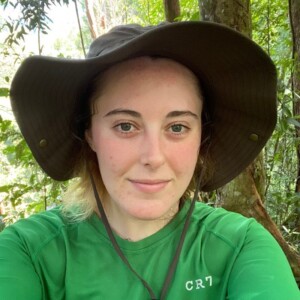
Beth Holdsworth
University of Birmingham
Project
Incorporating modelling and data to understand forest dynamics in a changing world
Supervisors
- Professor Nick Kettridge
- Dr Adriane Esquivel Muelbert
- Dr Thomas Pugh
PhD Summary
Climate is driving big changes in the lives of trees across the world’s forests, including increases in growth and mortality of trees. These changes govern the carbon uptake by forest biomass, as well as the future trajectory of species composition and ecosystem services. Yet the size of this carbon uptake and how it is changing around the world is actually quite poorly constrained.
This PhD project you will consider ground observations of forest dynamics from thousands of plots around the world, and combine them with the latest computational modelling to answer questions on how the worlds forests are changing.
Previous activity
I completed a BSc (hons) Zoology at the University of Cumbria, followed by an MRes Ecology at Newcastle University. For my MRes, I researched the use of roads by tropical forest mammals in Temburong, a remote area of Brunei Darussalam. I spent 5 months collecting data in Brunei using camera trapping and road transects. Whilst in Brunei, I also assisting in data collection for the PhD project “Biodiversity responses to infrastructure expansion in the Heart of Borneo, Brunei Darussalam”, which involved camera trapping, acoustic recorders, and vegetation surveys in the forest.
Since graduating, I have worked as an Assistant Geospatial Analyst with Environment Bank.
Why did you choose doctoral research?
I began my academic journey wanting to understand and contribute to conserving the natural world. Throughout my BSc I found my inclination towards research increase, leading me to pursue an MRes. I greatly enjoyed the opportunity to conduct my own research during my MRes, wishing I had more time and resources to put into the work.
Undertaking doctoral research will also allow me to develop skills outside of my project to help me grow as a researcher and a person.
Why did you choose CENTA?
I believe CENTA are dedicated to widening PhD opportunities for applicants from a diverse range of backgrounds and communities. CENTA focus on developing well-rounded researchers, ensuring we have ample opportunity to gain skills outside of our projects. I also think being part of a cohort provides an additional support network of individuals going through a similar experience.
Future plans
The skills, experience, and confidence I develop during my studentship will help me succeed in whichever direction I decide to take my career. I will also be able to establish an excellent network of friends and professionals through CENTA and my project.
